Profiles of victims of disappearances
It’s not only activists and CCP members that are targets. Everyone from celebrities, judges, foreigners and businesspeople are being caught up in the net.
Here are 11 victims from all walks of life who have been disappeared by the CCP in the past few years. This is part two, to read about China's expanding systems for disappearances, click here.
1: The Christian Pastor
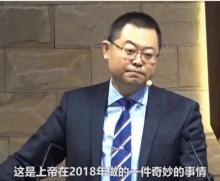 Wang Yi (王怡), a former rights lawyer, turned pastor of the church he founded with his wife Jiang Rong, the evangelical Early Rain Covenant Church in Chengdu, Sichuan province. While her husband took the pulpit and was the charismatic face of their successful underground church, Jiang worked behind the scenes, hosting Bible study groups in their home.
Wang Yi (王怡), a former rights lawyer, turned pastor of the church he founded with his wife Jiang Rong, the evangelical Early Rain Covenant Church in Chengdu, Sichuan province. While her husband took the pulpit and was the charismatic face of their successful underground church, Jiang worked behind the scenes, hosting Bible study groups in their home.
In December 2018, as part of a nationwide sweep against many unofficial religious gatherings in China, police from Chengdu City rounded up Jiang, Wang, and 100 others from the church. While many were released in the days to come, half a dozen including Jiang and her husband were disappeared on charges of inciting state subversion. Six months later Jiang was released on bail after her time in RSDL came to an end. Her husband however remains disappeared and has never, according to official souces, been placed in RSDL, but rather disappeared in police custody.
2: The Human Rights Lawyer
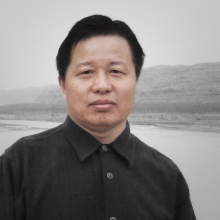 Long-time rights defender and renowned lawyer Gao Zhisheng (高智晟) disappeared in August 2017. Gao is variously described as China’s bravest, most prestigious and most persecuted human rights lawyer. Colleagues say he is articulate and brilliant in court. Yet he comes from humble beginnings, he even worked as a miner and vegetable seller before becoming a self-educated lawyer in his early thirties. He has twice been nominated for the Nobel Peace prize.
Long-time rights defender and renowned lawyer Gao Zhisheng (高智晟) disappeared in August 2017. Gao is variously described as China’s bravest, most prestigious and most persecuted human rights lawyer. Colleagues say he is articulate and brilliant in court. Yet he comes from humble beginnings, he even worked as a miner and vegetable seller before becoming a self-educated lawyer in his early thirties. He has twice been nominated for the Nobel Peace prize.
Gao was first disappeared in 2006. Since then he has been in one form of disappearance or another including secret detention, kept incommunicado in prison, or disappeared while technically released -- an extreme form of ‘non-release release’. He remains missing to this day.
3: The Journalist
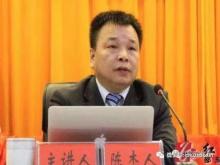 Longtime journalist Chen Jieren (陈杰人), fired twice as editor from state-owned media for having been too critical, was disappeared into RSDL in July 2018 after he accused two provincial leaders of corruption and malpractice. Police also disappeared his wife, two brothers and an assistant.
Longtime journalist Chen Jieren (陈杰人), fired twice as editor from state-owned media for having been too critical, was disappeared into RSDL in July 2018 after he accused two provincial leaders of corruption and malpractice. Police also disappeared his wife, two brothers and an assistant.
Since Chen was not accused of national security crimes, he should not have been denied access to a lawyer, but police kept him incommunicado with the excuse that the NSC had launched an investigation into his case. This represents a growing trend that the involvement of the NSC can be used to disappear anyone at any time. Chen is still under criminal detention.
4: The Foreigners
 Canadians Michael Kovrig, a former diplomat, and entrepreneur Michael Spavor, were disappeared in December 2018 and held in RSDL for nearly six months, seemingly as retaliation for Canada’s arrest of Huawei’s CFO following an extradition request from Washington. The two men remain in detention, charged with spying.
Canadians Michael Kovrig, a former diplomat, and entrepreneur Michael Spavor, were disappeared in December 2018 and held in RSDL for nearly six months, seemingly as retaliation for Canada’s arrest of Huawei’s CFO following an extradition request from Washington. The two men remain in detention, charged with spying.
There is a growing list of foreigners disappeared by China including citizens from Sweden, Australia and Taiwan. The most extreme example is that of Swedish publisher Gui Minhai, who was kidnapped in Thailand in 2015, smuggled into China illegally, and held in what was likely RSDL for half a year, forced to make several televised confessions, denied any lawyer and no official notice given of his detention. Gui remains a prisoner of the CCP.
5: The female rights defender
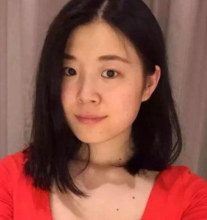 Zhao Wei (赵威) was a 20-something legal assistant who worked for prominent rights defense lawyer Li Heping in Beijing when she was disappeared in July 2015 during the ‘War on Lawyers’. She was held in secret detention in RSDL for six months where like most other victims she was kept in isolation and tortured. Female victims of enforced disappearances face the added risk of sexual abuse.
Zhao Wei (赵威) was a 20-something legal assistant who worked for prominent rights defense lawyer Li Heping in Beijing when she was disappeared in July 2015 during the ‘War on Lawyers’. She was held in secret detention in RSDL for six months where like most other victims she was kept in isolation and tortured. Female victims of enforced disappearances face the added risk of sexual abuse.
Zhao, like two other young women working as a paralegals, Gao Yue (高月) and Li Shuyun (李姝云), were officially arrested after their time in RSDL, but when placed into their pre-trial detention centers were registered under false names. For all the time she spent in the detention center, she continued to be missing, and cut off from the world, whereabouts unknown. For some, this new form of disappearance lasts a year, for some even longer. Woman rights defender Su Changlan (苏昌兰) lived with her fake name for nearly three years while awaiting trial, and once taken to hospital for care, they used yet another fake name, to ensure no one could track her down. Zhao was finally released in July 2016 on bail.
6: The NGO worker
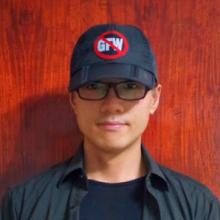 Zhen Jianghua (甄江华), the director of Human Rights Campaign in China, an NGO that aimed to build capacity for individuals to defend their rights and published information on human rights cases, was disappeared into RSDL in September 2017. Police threatened his family after they attempted to seek information on his case. After his transfer to detention, police told his lawyers they were fired – an increasingly common tactic despite no evidence Zhen had willingly fired them.
Zhen Jianghua (甄江华), the director of Human Rights Campaign in China, an NGO that aimed to build capacity for individuals to defend their rights and published information on human rights cases, was disappeared into RSDL in September 2017. Police threatened his family after they attempted to seek information on his case. After his transfer to detention, police told his lawyers they were fired – an increasingly common tactic despite no evidence Zhen had willingly fired them.
In December 2018, Zhen was sentenced to two years for inciting state subversion in a secret trial. Zhen is just one of many NGO activists targeted amid a widespread attack on civil society. Liu Feiyue (刘飞跃), director of China Rights and Livelihood Watch, and Huang Qi (黄琦), director of 64 Tianwang Human Rights Center, are but a few of the many other NGO leaders attacked, disappeared or arrested in China over recent years.
7: The labour activists
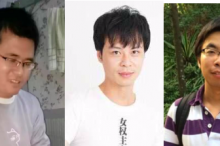 Wei Zhili (危志立), Ke Chengbing (柯成兵) and Yang Zhengjun (杨郑君) – collectively known as the “iLabour3” -- are a group of young men who launched the iLabour online platform aimed at raising awareness of labour rights issues. Their key campaign was helping migrant workers suffering from pneumoconiosis. Police threw Yang into RSDL in January 2019, while Wei and Ke were disappeared in March. None of them was allowed to hire their own lawyers. The police told the men’s’ families that they had fired their lawyers or didn’t want a lawyer – a tactic that has now become routine to prevent RSDL victims obtaining independent legal help.
Wei Zhili (危志立), Ke Chengbing (柯成兵) and Yang Zhengjun (杨郑君) – collectively known as the “iLabour3” -- are a group of young men who launched the iLabour online platform aimed at raising awareness of labour rights issues. Their key campaign was helping migrant workers suffering from pneumoconiosis. Police threw Yang into RSDL in January 2019, while Wei and Ke were disappeared in March. None of them was allowed to hire their own lawyers. The police told the men’s’ families that they had fired their lawyers or didn’t want a lawyer – a tactic that has now become routine to prevent RSDL victims obtaining independent legal help.
Wei was officially charged with picking quarrels and provoking troubles in August 2019, but the other two victims remain disappeared. This year, 2019, has seen an upsurge in disappearances of labour activists into RSDL in a way that is a repeat of the 2015 ‘War on Lawyers.’
8: The Tibetans
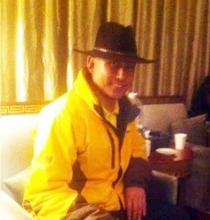 Lodoe Gyatso, a Tibetan activist from Sog County in the Tibet Autonomous Region and his wife Gakyi were disappeared in Lhasa, January 2018, shortly after Lodoe uploaded a video of himself calling for a Free Tibet.
Lodoe Gyatso, a Tibetan activist from Sog County in the Tibet Autonomous Region and his wife Gakyi were disappeared in Lhasa, January 2018, shortly after Lodoe uploaded a video of himself calling for a Free Tibet.
The police did not release any news of their fate until a year later when his family learned he had been sentenced to 18 years. His wife is serving a two-year sentence. No news was ever released of their arrest, detention or even trial. The family does not even know in which prison(s) they are being held. Lodoe is but one of many Tibetans, many of them ordinary citizens, who have been disappeared by the Chinese authorities, leaving their families and loved ones completely in the dark as to what has happened to them. People like Wangdu, Khenpo Pagah and Tibetan nun Sonam Lhatso have all suffered similar fates.
9: The Uighur
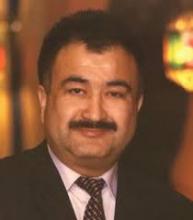 All news of famous Uighur comedian Adil Mijit went quiet in November 2018. 55-year-old Mijit, who lived in Urumqi, the capital of Xinjiang, had been working for a government arts troupe for 30 years when he disappeared. His family, who live in Turkey, fear he has been locked into a re-education camp.
All news of famous Uighur comedian Adil Mijit went quiet in November 2018. 55-year-old Mijit, who lived in Urumqi, the capital of Xinjiang, had been working for a government arts troupe for 30 years when he disappeared. His family, who live in Turkey, fear he has been locked into a re-education camp.
Uighurs with family overseas and who have travelled abroad themselves are routinely targeted and more recently popular cultural figures, like Mijit, have also gone missing.
10: The Hongkonger
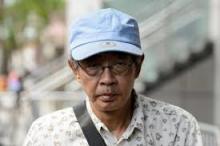 Bookseller Lam Wing-kee (林榮基) from Hong Kong was disappeared in late 2015 when he crossed the border into mainland China. Targeted because his shop sold books critical of the Chinese leadership –something which is legal in Hong Kong – he was held incommunicado in what was likely RSDL for several months, forced to appear in a televised confession, and then released on bail on condition he stay in Shaoguan, a city in southern China.
Bookseller Lam Wing-kee (林榮基) from Hong Kong was disappeared in late 2015 when he crossed the border into mainland China. Targeted because his shop sold books critical of the Chinese leadership –something which is legal in Hong Kong – he was held incommunicado in what was likely RSDL for several months, forced to appear in a televised confession, and then released on bail on condition he stay in Shaoguan, a city in southern China.
In June 2016, he was sent back to Hong Kong to collect a hard drive but decided instead to defy Chinese police and hold a press conference to go public with what had happened to him. Four other men, involved with the bookshop had been disappeared at the same time (Swede Gui Minhai and three other Hongkongers) by China as have several businesspeople. Lam now lives in Taiwan, afraid that he may be disappeared again if he stays in Hong Kong.
11: The government worker
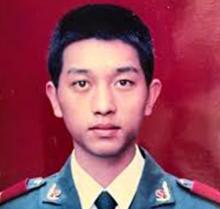 Chen Yong (陈勇), a former driver for a local government official in Fujian province was detained under Liuzhi by the local Supervision Commission in April 2018, just a few weeks after the secret detention system had been introduced nationwide. He had been detained to answer questions related to an investigation of his former boss, who was under investigation for corruption. A month later, Chen was reported dead. When his family came to view the body Chen’s face was disfigured and his torso was bruised and battered.
Chen Yong (陈勇), a former driver for a local government official in Fujian province was detained under Liuzhi by the local Supervision Commission in April 2018, just a few weeks after the secret detention system had been introduced nationwide. He had been detained to answer questions related to an investigation of his former boss, who was under investigation for corruption. A month later, Chen was reported dead. When his family came to view the body Chen’s face was disfigured and his torso was bruised and battered.
The Liuzhi system has also claimed some high-profile victims ranging from former Interpol chairman Meng Hongwei (孟宏伟), Supreme Court judge Wang Linqing (王林清), and an editor Dai Zaigeng (戴自更). Chen’s case illustrates that victims do not have to be CCP members or public servants to be detained under the secretive system.
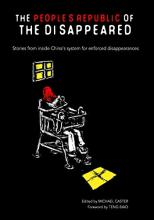 Read terrifying, in-depth, short stories written by victims of disappearances in critically acclaimed The People's Republic of the Disappeared, available worldwide on Amazon as paperback and kindle ebook. Edited by Safeguard Defenders Michael Caster, with a foreword by Teng Biao, exiled Chinese lawyer and himself a victim of being disappeared.
Read terrifying, in-depth, short stories written by victims of disappearances in critically acclaimed The People's Republic of the Disappeared, available worldwide on Amazon as paperback and kindle ebook. Edited by Safeguard Defenders Michael Caster, with a foreword by Teng Biao, exiled Chinese lawyer and himself a victim of being disappeared.